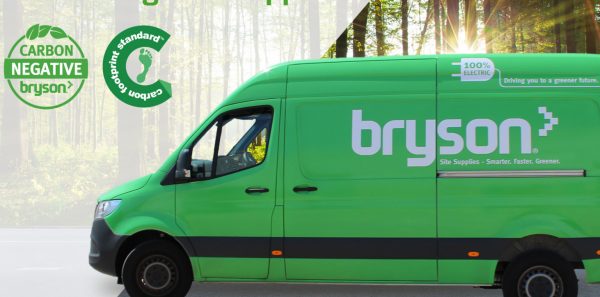
Bryson, a leading manufacturer and distributor of fixings, safety and protection products, has become the first certified Carbon Negative supplier in the construction industry, a significant move towards their long-term goal of being net-zero by 2030.
Bryson aims to become the sustainable supplier of choice for forward-thinking construction and fit-out contractors. Becoming carbon-negative means Bryson will offset more carbon than its remaining balance – for every tonne of CO2 they emit, as a company they will remove an extra 10% of carbon from the environment, therefore emitting less than zero CO2 greenhouse gasses.
With the help of their accredited partner Carbon Footprint, Bryson assessed their carbon emissions for 2021 producing 168 tC02e – a 15% reduction from their baseline year in 2019. Each year Bryson will continue to focus on their net-zero goal, and until it’s reached, will continue to offset more carbon than they produce to be Carbon Negative.
Lauren Sowden, Marketing & Sustainability Manager at Bryson, said: “We are delighted to become the first certified Carbon Negative supplier in our industry and hope our achievements will inspire other companies to take action and shape a greener future. Sustainable construction reduces the impact of the industry on the environment, and we can be part of this movement by making small changes. At Bryson, we have done this by tracking and reducing our carbon emissions, reducing our waste and energy consumption, working with like-minded suppliers, and talking to our customers to collaborate on greener initiatives.
Sowden continued: “I speak on behalf of our wonderful team when I say we are committed and will continue to invest and work on new initiatives that will further drive down Bryson’s carbon footprint until we reach our net-zero 2030 goal.”
To achieve their green ambitions, Bryson has set out a 3P Sustainability Strategy – three key pillars focusing on the planet, procurement and people.
Bryson has been working in partnership with the Verified Carbon Standards (VCS) to take part in carbon offsetting projects which include planting trees in the UK and reducing emissions from deforestation in the Amazon Rainforest, the largest remaining rainforest in the world.
One of the main reductions in Bryson’s CO2es was due to an increase in their use of hybrid vehicles and a reduction in electricity usage. Looking forward, some key initiatives for carbon reduction include transitioning to an all-electric vehicle (EV) delivery fleet by 2023, reducing site energy consumption across the business and moving to green renewable energy sources, and using other more sustainable modes of transport for business travel.
Bryson has launched other initiatives to help the construction industry reduce waste and promote reuse, such as PPE Recycling where nothing goes to landfill meaning all 5-point PPE can be responsibly recycled or reused. Bryson has also changed its packaging to tackle single-use plastics and is now plastic-free on all direct packaging. Further plans to reduce single-use plastic in product packaging are in place as Bryson continues to work with their top suppliers to achieve plastic-free packaging.
When looking at ethical procurement, Bryson has looked at sustainable sourcing and innovative product solutions. The organisation has reduced the risk in its supply chain by supporting local manufacturing where possible and has sought out sustainable, low-impact and plastic-free product innovations.
Outside of the company, Bryson has been helping its customers achieve their sustainability goals with a focus on how deliveries are received. Finally, Bryson has engaged with its staff and local communities by working on their employee health, safety, welfare and development and partnering with social enterprises.
Bryson worked with the globally renowned Carbon Footprint Ltd to achieve its environmental credentials. Carbon Footprint Ltd is the first choice for blue-chip and mid-market companies through to SMEs and public sector organisations.

